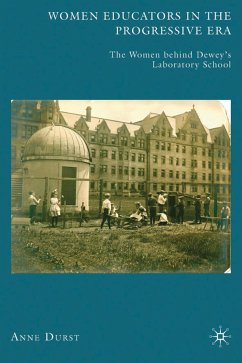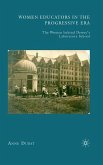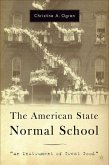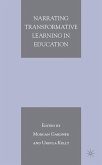In 1896, John Dewey established the Laboratory School at the University of Chicago - an experimental school designed to test his ideas in the reality of classroom practice. Through a collective portrait of four of the school s teachers Women Educators in the Progressive Era examines the struggles and satisfactions of teaching at this innovative school, and situates the school community in the context of Progressive Era experimental impulses in Chicago and the nation. This book reassesses the implications of Dewey s ideas for current efforts to improve schools, as it explores how the Laboratory School teachers participated in inquiry designed to advance educational thought and practice.
"Durst has captured, in all its glory and messiness, the truly communal spirit of John Dewey's Lab School. Scouring the nation's archives for personal papers of four teachers, she has reconstructed the 'organic circuit' of learning and teaching at the Lab School, in which these teachers strove to achieve creativity and balance on issues of students' freedom, interests, and communal responsibilities. This beautifully written study reminds us that the Lab School and its teachers are still capable of inspiring us, 110 years after its meteor crossed our skies." - Carl F. Kaestle, University Professor and Professor of Education, History, and Public Policy, Emeritus, Brown University, USA
"Durst takes us inside the Dewey School classrooms and the teachers' meetings and explores the challenges, rewards, and occasional frustrations of putting Dewey's pedagogical theories into practice. This book is particularly impressive in bringing to light some of the implications of Laboratory School teaching for contemporary educators. I have met many teachers who have read Dewey and believe he has something important to offer them, but wish they had some more concrete idea of what 'Deweyan teaching' and a 'Dewey school' would look like. Durst provides just this sort of thing. The interest in this project lies then as much in the lessons it will afford today's teachers as in the rewards it will offer to students of a crucial episode in our educational past. Durst's bookseems to me to belong on a short list of texts one would want to hand someone who asks why John Dewey still matters." - Robert Westbrook, Professor of Education History, University of Rochester and author of John Dewey and American Democracy
"Through the correspondence of four Dewey School teachers - Anna Camp, Katherine Camp, Althea Harmer, and Mary Hill - Durst offers readers a close look at how the curriculum, pedagogy, administration, and intellectual community of the experimental school was constructed collectively through a reflective approach of trial and error. . . This is a beautifully crafted study." - History of Education Quarterly
"Durst takes us inside the Dewey School classrooms and the teachers' meetings and explores the challenges, rewards, and occasional frustrations of putting Dewey's pedagogical theories into practice. This book is particularly impressive in bringing to light some of the implications of Laboratory School teaching for contemporary educators. I have met many teachers who have read Dewey and believe he has something important to offer them, but wish they had some more concrete idea of what 'Deweyan teaching' and a 'Dewey school' would look like. Durst provides just this sort of thing. The interest in this project lies then as much in the lessons it will afford today's teachers as in the rewards it will offer to students of a crucial episode in our educational past. Durst's bookseems to me to belong on a short list of texts one would want to hand someone who asks why John Dewey still matters." - Robert Westbrook, Professor of Education History, University of Rochester and author of John Dewey and American Democracy
"Through the correspondence of four Dewey School teachers - Anna Camp, Katherine Camp, Althea Harmer, and Mary Hill - Durst offers readers a close look at how the curriculum, pedagogy, administration, and intellectual community of the experimental school was constructed collectively through a reflective approach of trial and error. . . This is a beautifully crafted study." - History of Education Quarterly








